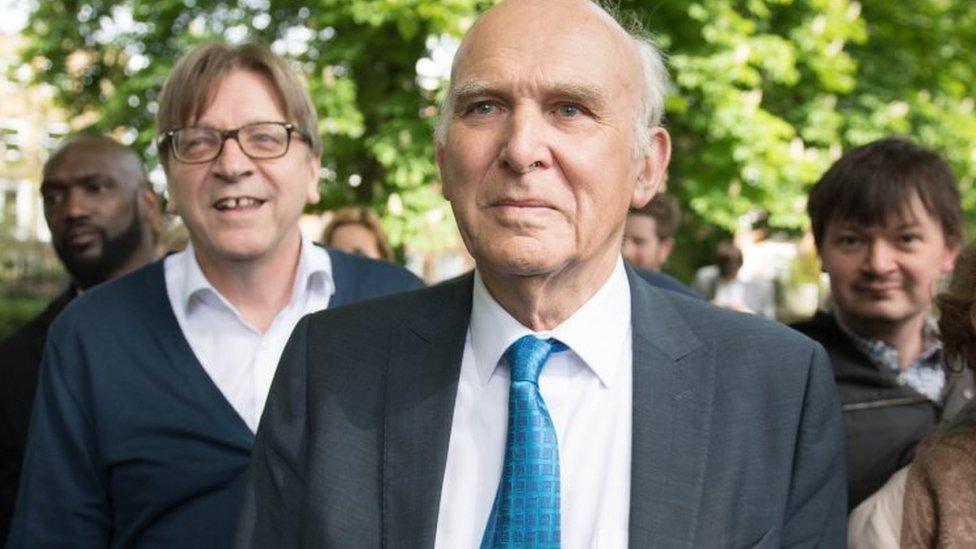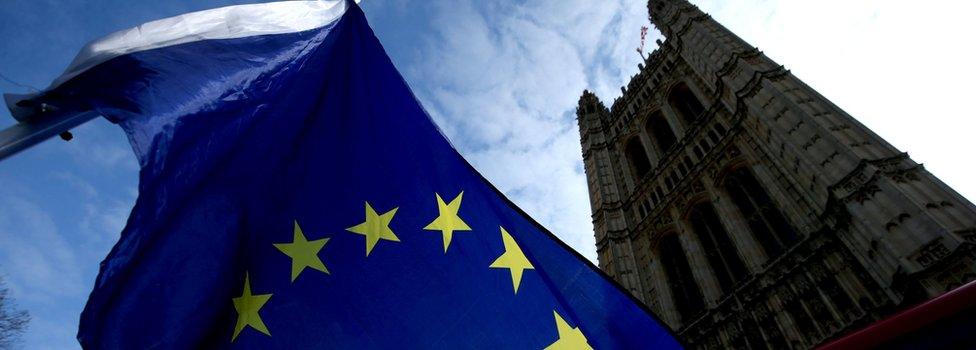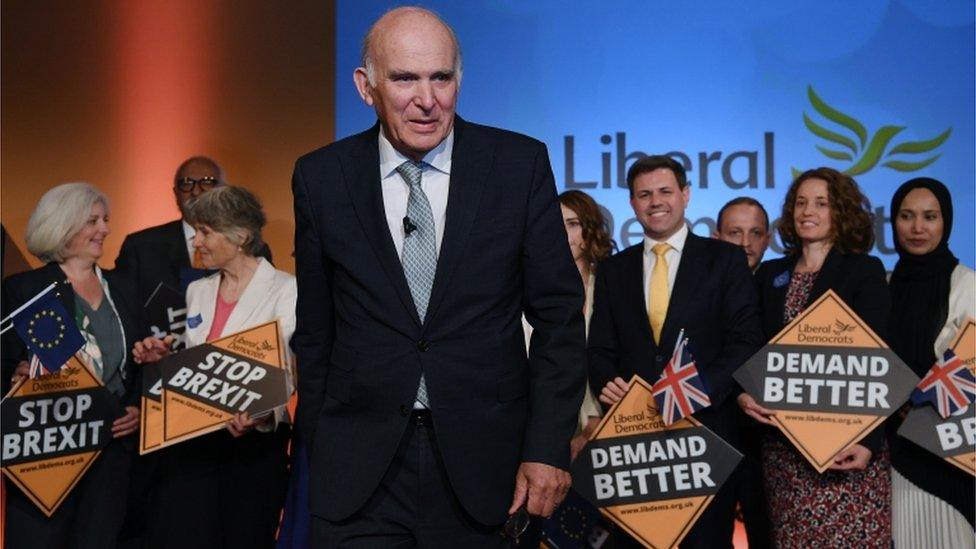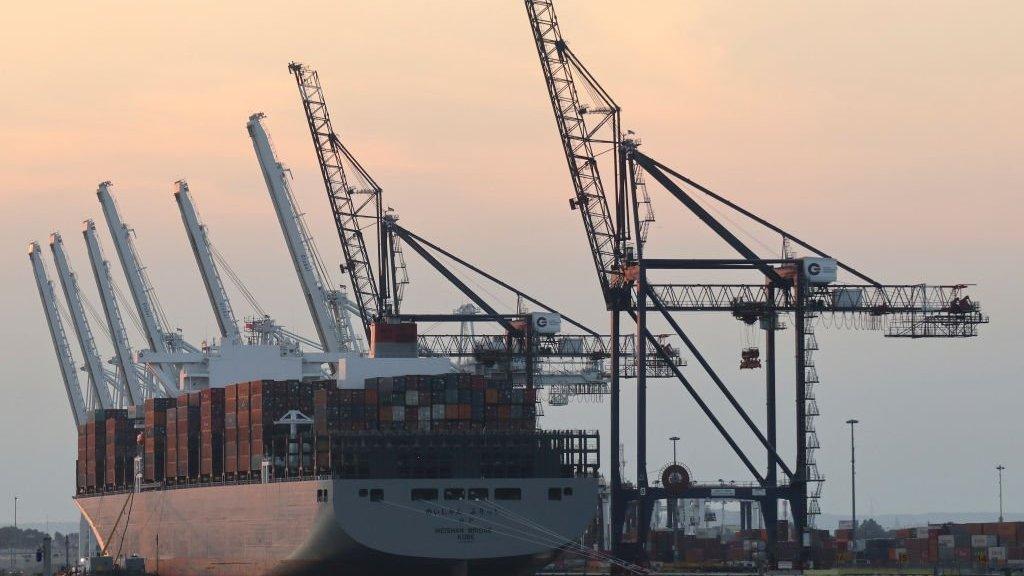EU elections: Cable says Remain parties 'shouldn't be squabbling'
- Published
- comments

Lib Dem leader Vince Cable said he had hoped to work with the Green Party and Change UK during the EU election
Lib Dem leader Vince Cable says he was in favour of working with other Remain parties to present a "common front" at the European elections.
The pro-EU MP told LBC Radio he had approached the Green Party and Change UK to suggest joint candidates.
He said the parties "shouldn't be squabbling", but added: "Frankly, we didn't get a very warm reception."
The Greens say joint lists are not "desirable" and Change UK has said an alliance "wasn't ever on the agenda".
The Green Party has also insisted it has never been approached, formally or informally, by the Liberal Democrats about working together.
Elections for 73 MEPs to the European Parliament will take place on 23 May.
The UK had been due to leave the EU on 29 March, but the deadline has now been pushed back to 31 October, meaning the country has to take part in the polls.
The Liberal Democrats pledged to stop Brexit at the launch of their European election campaign last month.
The Green Party and Change UK are also standing on pro-EU platforms.
There were suggestions last week that pro-Remain parties could back a joint candidate in the forthcoming Peterborough by-election, but those efforts were not successful.
The candidate they had planned to back, Femi Oluwole, told the BBC he had pulled out over concerns his candidacy would hand victory to the Brexit Party and ultimately harm the campaign for another referendum.
'Difficult years'
Talking to LBC radio, external, Mr Cable said: "We shouldn't be squabbling, we shouldn't be behaving like kids in a playground.
"We should be getting together in a grown-up way and presenting a common front."
But, he said, when the election was over he hoped the parties could "work constructively together".
He said his party had "survived the difficult years" and people now recognised it was strong, particularly following gains in the local elections earlier this month.
Mr Cable said the "only way" to resolve the current impasse and to stop Brexit was to "go back to the people" with another referendum.
On a potential ballot paper, he said the "two main choices" and "realistic options" would be to remain in the EU or to leave with Theresa May's deal.
He said the WTO (World Trade Organization) no-deal option argued for by Brexit Party leader Nigel Farage was a "weak" option and "needs to be exposed".
The case against it, though, "hasn't been made as strongly as it should have been".
"The only two countries that operate effectively under WTO rules are China and Russia," he said.
The EU is "far from perfect" and there are "many, many things that need changing", but it "does provide security", Mr Cable added.
The Green Party has said there are "fundamental ideological differences" between the Remain parties on other issues.
Co-leader Jonathan Bartley told Mr Cable - via a public Twitter message, external - he wanted to "put to bed" the idea that the Lib Dems had reached out to his party and been rebuffed.
"You haven't approached any of us but please come and have a public and accountable discussion with me. Name the time and place?" he wrote.
Chris Leslie, the former Labour MP who quit to join Change UK, has previously told Business Insider, external he didn't think an alliance would "ever be likely because we are starting something new".
Labour 'all over'
Mr Cable is due to stand down as Lib Dem leader this month.
The party's education spokeswoman, Layla Moran, ruled herself out of the running to succeed him on Tuesday, saying her "first priority has to be to serve my constituents to the best of my ability" and being leader would dilute that effort.
Deputy leader Jo Swinson, the frontrunner to replace Mr Cable, criticised Labour for "negotiating to try to make Brexit happen" and for being "all over the place" on the issue.
Her comments come as talks between Labour and the government continue talks aimed at finding a way to leave the EU.
At the same time, Labour deputy leader Tom Watson says his is the party of "Remain and reform", while Brexit spokesman Sir Keir Starmer has said there should be a referendum on any cross-party deal.

Who is standing in the European elections?

The UK is divided into 12 regions, each represented by between three and 10 MEPs depending on population size.
Seats in England, Scotland and Wales are awarded to parties according to their share of the vote, to candidates on lists drawn up by the parties.
Northern Ireland elects MEPs using a single transferable vote system, with voters able to rank candidates in order of preference.

Update 25 June 2019: This article has been updated to point out that the Green Party has consistently denied ever being approached, formally or informally, by the Liberal Democrats or Sir Vince Cable about working together.
- Published26 April 2019

- Published13 December 2020
